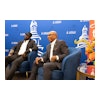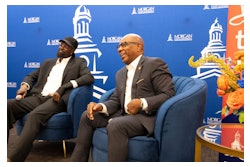Out of Africa
Kenya and Nigeria remain the only African countries to rank in the top 20 places of origin for international students studying in the United States.
By Marisa Picker
Of the top 20 countries of origin for international students studying in the United States, only two — Kenya and Nigeria — are located in Africa. Kenya ranked 17th and Nigeria 18th in the latest figures released by the Institute of International Education.
India topped the list, followed by China, Korea, Japan and Canada.
According to IIE’s 2006 Open Doors report, there were 6,192 Nigerians studying in the United States in 2005-2006, a 2.3 percent drop from the 6,335 students here the previous year. The 2005-2006 academic year also saw a 2.5 percent drop in the number of Kenyans studying in America, sliding from 6,728 to 6,559. The number of Kenyan students has fallen almost 17 percent since the 2003-2004 academic year.
“Kenya’s numbers have decreased for three years in a row, but last year’s decline was much smaller than that of the previous two years, leading to hope that they will also soon turn their curve upwards,” says Nancy W. Keteku, IIE’s regional education coordinator for Africa.
A tighter and more inhospitable student visa application process in the aftermath of the Sept. 11, 2001 terrorist attacks has been cited by some experts as one factor behind the general decline in the number of international students. Fraud and competition from other destination countries have also been offered as explanations, as has educational progress on the African continent.
“First, after 9/11, and particularly beginning in 2003, it got tougher and became much more of a hassle to get a student visa to the U.S.,” says Ross Mason, international director of InternationalStudent.com. “This was particularly true for students from Africa and the Middle East.”
He adds that countries like Nigeria have also been perceived as ripe for fraud, leading U.S. officials to worry that non-students could find their way into the country using forged documents. Keteku, however, contends that Nigeria is actively combating that image.
“Nigerians are increasingly able to overcome their country’s reputation for fraud and convince admissions committees of their potential, an important breakthrough,” she says. “Last year’s mild downturn in Nigeria is most likely a statistical blip from which they’ll recover quickly, resuming their inexorable march to overtake Kenya and gain the No. 1 position in Africa.”
However, students’ misconceptions about the post-Sept. 11 difficulty of obtaining an American student visa is one of their biggest obstacles to international education, says Peggy Blumenthal, executive vice president of IIE. Although the U.S. State Department has become somewhat more liberal when it comes to issuing visas, students are still discouraged through hearsay.
“The universities and IIE are trying to figure out how to break that bad-news cycle,” says Blumenthal, adding that competition has inspired recruiters to take the initiative.
“In Kenya, aggressive recruiting by the Australians, British and Canadians has likely syphoned off some students who would otherwise have gone to the U.S.,” agrees Keteku.
Gail Szenes, director of the Office of International Students and Scholars at New York University, says her institution has had to step up recruiting efforts because of fierce competition from U.S. schools as well as programs from other countries that had not recruited before. Szenes says the eroding African economy has also undermined international education.
“There was a time when Nigeria was sending the most students, during the early to mid 1970s,” she says. “As the economic picture got worse and aid money has dwindled, enrollment has gone way down.”
While many regions in Africa are struggling, more developed areas, like Nairobi, are building new colleges and universities, which could also explain why fewer Africans are looking to the United States for their education.
“Local university systems in African countries are often in poor shape, rigidly structured, underresourced and beset by political strife,” Keteku says. “If, as in Taiwan or South Africa, the middle class grows and with it the local university system, we’ll see fewer students seeking a U.S. education and it will be a healthy sign.”
When students’ needs are met at home, they may choose not to study abroad, Keteku says. But she notes that there are still advantages to studying in America.
“They understand that U.S. education particularly prepares Africans for the complex leadership and development challenges that face the continent,” she says.
“The goal [to these international programs] is to build capacity back home,” adds Blumenthal. “I think we consider it great if people can come here and great if people can start here and go back to educate the following generation using what they learned in the States.”
© Copyright 2005 by DiverseEducation.com


















